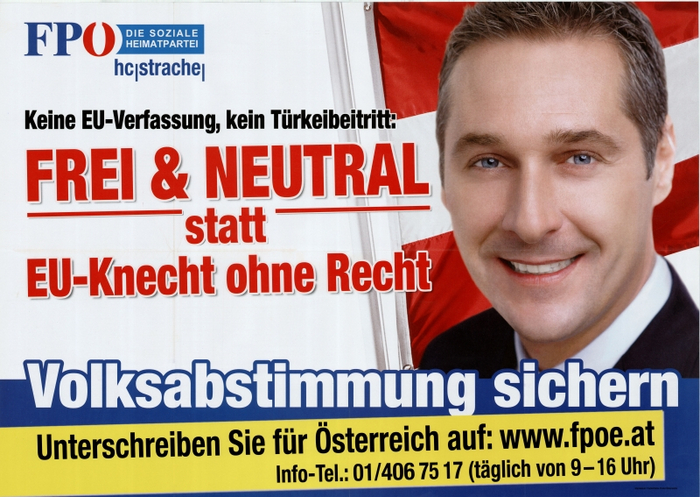
Popular Petition 2006 “Austria remain free!”
In 2006, the FPÖ initiated the popular petition “Austria remain free!”. The registration week was from 6 to 13 March 2006. A total of 258,281 Austrians supported the petition (ranked 24th of the 50 popular petitions conducted up to 2020). It constituted a paradigm shift in Freedom Party politics, but also a kind of FPÖ “pre-campaign” for the National Council election of October 2006.
Short description
The Freedom Party’s popular petition “Austria remain free!” pursued three central goals:
– the preservation of Austrian neutrality;
– the prevention of Turkish accession to the EU;
– the rejection of the EU Constitution in the form it existed in 2005.
The background to the referendum was the fact that, in the course of the attempts to establish a common European constitution, the population was kept in the dark about what effects this would have had on Austrian neutrality. A particular focus of Freedom Party criticism was the tendency towards a strong centralisation of the European Union.
In addition, there was the desire on the part of European politicians to admit Turkey to the European Union as quickly as possible, an undertaking for which the Austrian ÖVP Chancellor Wolfgang Schüssel indirectly helped pave the way by agreeing to negotiations on Turkey's admission to the EU.
The internal situation of the FPÖ also played a role in the initiation of the popular petition. Together with the Austrian People's Party (ÖVP), the Freedom Party had until 2005 pursued a government policy hostile to neutrality and even before then been more inclined to advocate Austria's accession to NATO. It had also voted for an EU constitution. The BZÖ’s split from the FPÖ and the launch of this petition signalled the Freedom Party’s departure from that policy.
Another reason for the popular petition was probably that, in the immediate aftermath of the BZÖ splitting away, it could function as an FPÖ “interim campaign” for the 2006 National Council election.
Impact
The petition’s impact upon neutrality remains unclear to this day. The EU Constitution in its then form failed due to referenda held in France and in the Netherlands, but was later introduced through the back door as the "Lisbon Treaty". Turkey's EU accession remains uncertain to this day, but is currently rather unlikely.
